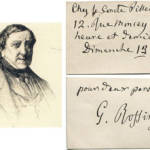
One more thing to thank the Enlightenment for.
I’m reading a biography of Rossini. Gioachino was born into a musical family in February 1792 (two months after the death of Mozart), but his family always struggled financially. In the music world of the 1700s, the castrati had reached the height of their popularity due to the quality of their voices.
“In the 1720s and 1730s, at the height of the craze for these voices, it has been estimated that upwards of 4,000 boys were castrated annually in the service of art. Many came from poor homes and were castrated by their parents in the hope that their child might be successful and lift them from poverty.”[1]
In his later years Rossini described the castrati this way: “I have never forgotten them. The purity, the miraculous flexibility of those voices and, above all, their profoundly penetrating accent — all that moved and fascinated my more than I can tell.”[2]
But it had been a close call for the boy Gioachino. Biographer Richard Osborne says that “his maternal uncle … had suggested that the boy be castrated on the ground that the majority of operatic castrati live in great opulence.”[3]
What to do, what to do?

Enlightenment humanism had led to a significant decline in castrations for musical purposes, and the practice had been made illegal in part of northern Italy by the 1790s (though it was not illegal in all of Italy until the unification of 1870). But, reported Rossini later, his mother put her foot down and “would not consent at any price.” So Gioachino avoided the knife and instead of becoming a singer went on to write Semiramide, William Tell, The Barber of Seville, and other classics.
Good choice, Signora Rossini. Thank you.
Sources: [1] Castrato. Wikipedia. [2] and [3] Richard Osborne, Rossini (Oxford University Press, 2007), pp. 13 and 14.
Related: This excerpt from Explaining Postmodernism:
Mozart was Rossini’s favorite composer and his greatest influence, indeed, he was known as “the little Mozart” in music school. However, he stood in awe of Beethoven, who admired his operas. When he visited the Master in Vienna, Beethoven, in excellent Italian, remarked : “Indeed, you should write comedies, Rossini. How could an Italian person write tragedies? It is not the nature of your folk. Give us more ‘Barbers’!” To which Rossini answered, “Master, you are a genius!”
The possession of “two big ones” seems critical to any composer’s success. Bach had 20 children, Beethoven was a most virile man, Wagner chased anything in skirts, Schubert had to be dissuaded from visiting the local cathouse, Haydn pursued English ladies in particular, and even Brahms, who suffered from impotence (apparently he associated sex with prostitution), dedicated most of his music to women or wrote so “romantically” it is a strange female indeed who does not like his work. Mozart’s letters to Constanze are full of comments like “my friend is standing erect and wishes he were there with you.” There are few homosexual composers, although many, like Tschaikovski, had “leanings” (although Peter Ilyich had a miserable marriage) — I know of no great ones. Rossini, like Verdi, sought out female companionship. Most of these men were discreet.
I think they also wanted to castrate Vivaldi, but he became a priest instead, often getting into trouble because he would abandon the altar to scribble down a random melodic idea. Rossini was so lazy that, as he composed in bed, should a part of his manuscript fall down to the floor, he would simply write it out again and not retrieve the page. Once he had to be locked in a room with a death-threat should he not finish the overture (for such he was particularly known) by morning. He claimed this nervous consternation to be a wonderful source of inspiration.
Please note that needing “two big ones” — and in tune with my previous comments on this blog — women make poor composers, the best of them composing on the piano like Clara Schumann and Fanny Mendelssohn. Nice stuff, but like the works of Sylvia Beach, Thea Musgrave…the list goes on…as writers of symphonies, chamber music, even choral stuff, their work is worse than drivel. They CAN write good tunes as in Joni Mitchell etc. but these melodies are usually folk-music-ish, and often, pentatonal. The sheer energy of organizing thousands of notes on a score is beyond them. Even as conductors their work is undistinguished. Of course, if you don’t like their stuff, you are prejudiced, or a “male chauvinist pig.”
Beethoven said it best, to Bettina von Arnim: “Whereas you ladies have not the ability to compose a symphony, you may inspire one merely with the motion of your eyelashes.”
I hope Stephen Dahl’s comments made him feel like he has two big ones. But I think we all know better.